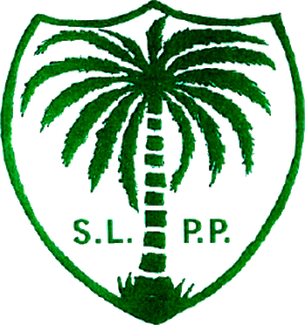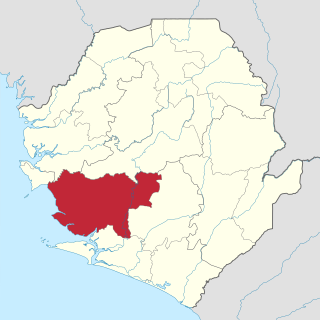
The Sierra Leone People's Party (SLPP) is one of the two major political parties in Sierra Leone, along with its main political rival the All People's Congress (APC). It has been the ruling party in Sierra Leone since 4 April 2018. The SLPP dominated Sierra Leone's politics from its foundation in 1951 to 1967, when it lost the 1967 parliamentary election to the APC, led by Siaka Stevens. Originally a centre-right, conservative party, it identifies since 2012 as a centre-left social democratic party, with a centrist tendency.

The Mende are one of the two largest ethnic groups in Sierra Leone; their neighbours, the Temne people, constitute the largest ethnic group at 35.5% of the total population, which is slightly larger than the Mende at 31.2%. The Mende are predominantly found in the Southern Province and the Eastern Province. The Mende are mostly farmers and hunters. Some of the major cities with significant Mende populations include Bo, Kenema, Kailahun, and Moyamba.

Siaka Probyn Stevens was the leader of Sierra Leone from 1967 to 1985, serving as Prime Minister from 1967 to 1971 and as President from 1971 to 1985. Stevens' leadership was often characterized by patrimonial rule and self-indulgence, consolidating power by means of corruption and exploitation.

Moyamba District is a district in the Southern Province of Sierra Leone, with a population of 318,064 in the 2015 census. Its capital and largest city is Moyamba. The other major towns include Njala, Rotifunk and Shenge. The district is the largest in the Southern Province by geographical area, occupying a total area of 6,902 km2 (2,665 sq mi) and comprises fourteen chiefdoms.

Brigadier David Lansana was the first prominent Sierra Leonean in the Sierra Leone Military during the colonial era. After Sierra Leone gained independence, he served as Military Attaché to the United States.
Sir Albert Michael Margai was the second prime minister of Sierra Leone and the half-brother of Sir Milton Margai, the country's first Prime Minister. He was also the father of Sierra Leonean politician Charles Margai.
Francis Misheck Minah was a Sierra Leonean statesman, lawyer and politician who served as First Vice President of Sierra Leone from 1985 to 1987 under President Siaka Stevens. An ethnic Mende from the Pujehun District, he became a member of the House of Representatives in 1967. He had previously served as Minister of Foreign Affairs, Minister of Health, Minister of Trade and Industry and Attorney General and Minister of Justice.
Moyamba is the capital and largest city of Moyamba District, in the Southern Province of Sierra Leone. There has been a recorded population of 11,485 in the 2004 census. The city is ethnically diverse, although the Mende people make up the majority. The city is home to the Hatford Secondary School for Girls, which is one of the elite secondary schools in Sierra Leone. The school attract some of the most gifted students from all parts of Sierra Leone, along with students abroad. The school is an all-girls secondary school, and the students are in a boarding home in the school campus. The city has a history of producing some of Sierra Leone's most prominent politicians, including the country's first president, Siaka Stevens.

Soccoh Kabia is a Sierra Leonean politician and physician who served as the Minister of Health, Minister of Social Welfare, Gender and Children's Affairs, and Minister of Fisheries and Marine Resources of Sierra Leone from 2007 to 2013.

Paramount Chief Ella Koblo Gulama OBE, GCOR was a Sierra Leonean paramount chief and politician. In 1957, she became the first elected female Member of Parliament in Sierra Leone. She was re-elected in 1962. During the government of Milton Margai, Gulama became Sierra Leone and sub-Saharan Africa's first female Cabinet Minister.
Julius Momoh Gulama was a Sierra Leonean King, statesman and educator in the pre-independence era. As King of Kaiyamba Chiefdom, he ruled the largest and most powerful Mende chiefdom in the Sierra Leone.
Momoh Gulama was a Sierra Leonean paramount chief who ruled Kaiyamba Chiefdom in Moyamba District.

Bai Koblo Pathbana II, was a paramount chief and politician in Lunsar, Port Loko District, Sierra Leone. He was crowned the 43rd Paramount Chief of Marampa-Masimera Chiefdom in 1943.
Madam Lucy Gulama was the wife of Sierra Leonean Paramount Chief Julius Gulama.

General elections were held in Sierra Leone on 17 March 1967. They were won by the opposition All People's Congress, marking the first time that a ruling party had lost an election in sub-Saharan Africa. However, the APC was overthrown in a military coup hours after taking power. The party was later restored to office after a counter-coup the following year and established a long-standing dictatorship.

The Dominion of Sierra Leone was an independent sovereign state with Queen Elizabeth II as its head of state between independence on 27 April 1961 and becoming the Republic of Sierra Leone on 19 April 1971.
Francis Obai Kabia is a Sierra Leonean politician who was operations officer for the UN Department of Peacekeeping Operations from 1983 to 2006.
Harford Secondary School for Girls is a secondary school for girls in Moyamba, Sierra Leone.

The 1967 Sierra Leonean coups d'état were two successive coups in Sierra Leone that took place from March 21 to 23, 1967.








